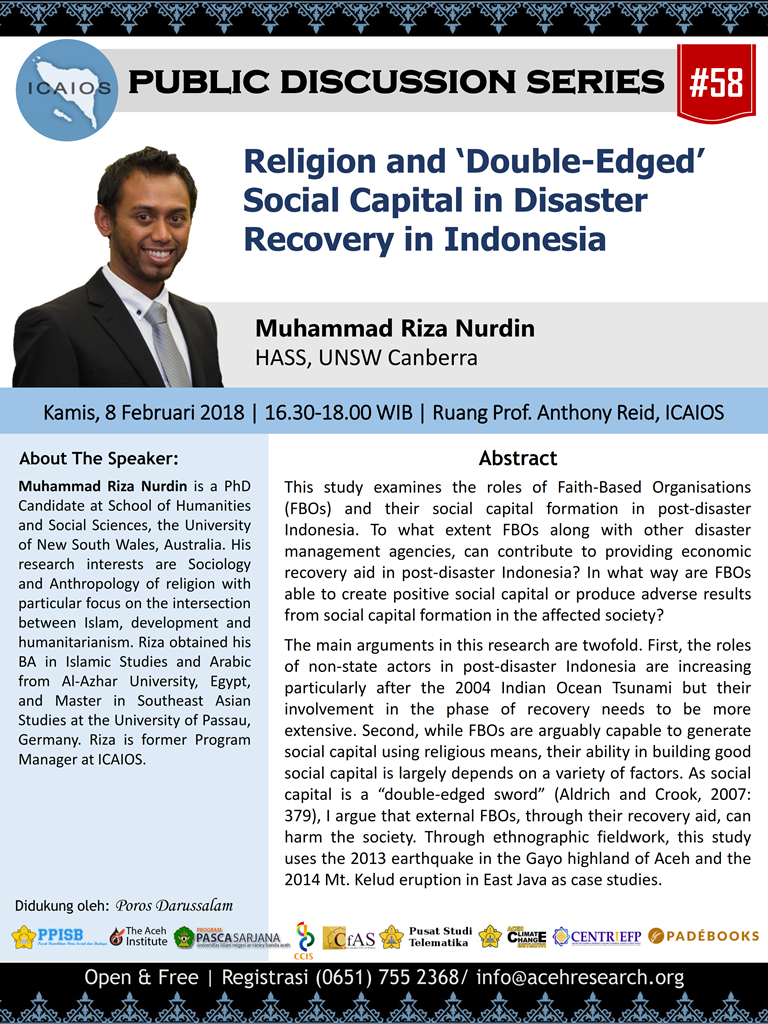
Public Discussion Series
Religion and 'Double-Edged' Social
Capital in Disaster Recovery
in Indonesia
Capital in Disaster Recovery
in Indonesia
Speaker:
Muhammad Riza Nurdin
HASS, UNSW Canberra
| Thursday, 08 February 2017 | 16.30 - 18.00 WIB |
| Prof. Anthony Reid Seminar Room, ICAIOS |
| Prof. Anthony Reid Seminar Room, ICAIOS |
About The Speaker:
Muhammad Riza Nurdin is a PhD Candidate at School of Humanities and Social Sciences, the University of New South Wales, Australia. His research interests are Sociology and Anthropology of religion with particular focus on the intersection between Islam, development and humanitarianism. Riza obtained his BA in Islamic Studies and Arabic from Al-Azhar University, Egypt, and Master in Southeast Asian Studies at the University of Passau, Germany. Riza is former Program Manager at ICAIOS.
About PDS:
This study examines the roles of Faith-Based Organisations (FBOs) and their social capital formation in post-disaster Indonesia. To what extent FBOs along with other disaster management agencies, can contribute to providing economic recovery aid in post-disaster Indonesia? In what way are FBOs able to create positive social capital or produce adverse results from social capital formation in the affected society?
The main arguments in this research are twofold. First, the roles of non-state actors in post-disaster Indonesia are increasing particularly after the 2004 Indian Ocean Tsunami but their involvement in the phase of recovery needs to be more extensive. Second, while FBOs are arguably capable to generate social capital using religious means, their ability in building good social capital is largely depends on a variety of factors. As social capital is a “double-edged sword” (Aldrich and Crook, 2007: 379), I argue that external FBOs, through their recovery aid, can harm the society. Through ethnographic fieldwork, this study uses the 2013 earthquake in the Gayo highland of Aceh and the 2014 Mt. Kelud eruption in East Java as case studies.
Muhammad Riza Nurdin is a PhD Candidate at School of Humanities and Social Sciences, the University of New South Wales, Australia. His research interests are Sociology and Anthropology of religion with particular focus on the intersection between Islam, development and humanitarianism. Riza obtained his BA in Islamic Studies and Arabic from Al-Azhar University, Egypt, and Master in Southeast Asian Studies at the University of Passau, Germany. Riza is former Program Manager at ICAIOS.
About PDS:
This study examines the roles of Faith-Based Organisations (FBOs) and their social capital formation in post-disaster Indonesia. To what extent FBOs along with other disaster management agencies, can contribute to providing economic recovery aid in post-disaster Indonesia? In what way are FBOs able to create positive social capital or produce adverse results from social capital formation in the affected society?
The main arguments in this research are twofold. First, the roles of non-state actors in post-disaster Indonesia are increasing particularly after the 2004 Indian Ocean Tsunami but their involvement in the phase of recovery needs to be more extensive. Second, while FBOs are arguably capable to generate social capital using religious means, their ability in building good social capital is largely depends on a variety of factors. As social capital is a “double-edged sword” (Aldrich and Crook, 2007: 379), I argue that external FBOs, through their recovery aid, can harm the society. Through ethnographic fieldwork, this study uses the 2013 earthquake in the Gayo highland of Aceh and the 2014 Mt. Kelud eruption in East Java as case studies.
